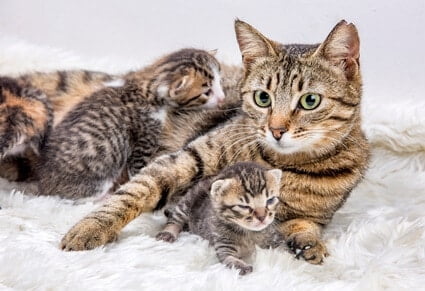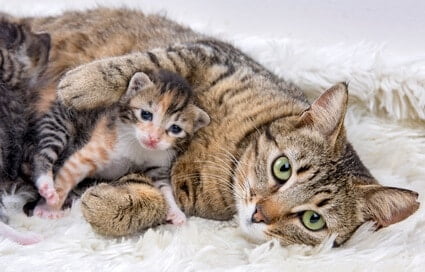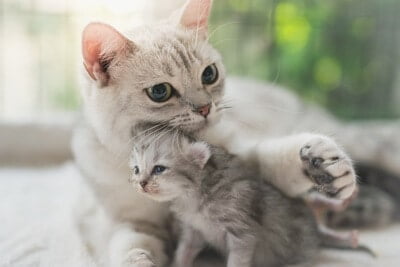Female cats have a well-earned reputation for being maternal animals. When a cat births her litter, she’ll take good care of her young. This can make it seem odd when a cat moves her kittens around the home.
Cats move their kittens for protection, warmth, and security. Sometimes a cat will move her kittens when she needs a break. Check that they’ve been left somewhere warm and aren’t being subjected to excessive light or noise.
Be mindful of how your cat behaves after giving birth. Maternal instincts dictate that she will be more on edge than normal and won’t want you touching her kittens. Monitor the mother and her kittens from a safe distance to make sure that everyone is safe and healthy.
Is it Normal for Cats to Move Their Kittens?
Some of the habits of a new mother may seem baffling, especially the so-called “2 week move.” Rest assured, this behavior is entirely normal in cats and rarely a cause for concern.
Most queens will start to move their kittens at 2 weeks of age. It’s worth noting the timeframe as most cats won’t move their kittens for their first 14 days of life.
Kittens are reliant on their mother for the first 2 weeks of their life. As newborns, kittens are blind and deaf as they cannot open their eyes or ears. A mother will know this and keep the kittens nearby.
If the mother is comfortable in her surroundings, she’ll not move her kittens for these first 2 weeks. It’s only after this point that the kittens show some level of awareness. By the age of 14 days, kittens can often see and hear from themselves. Ergo, the queen feels slightly more comfortable moving her young.
Why Do Mother Cats Move Their Kittens?
“Why does my female cat keep moving her kittens?” is a question often asked by owners. If you’re not a professional cat breeder, you may never have witnessed this behavior before. Thankfully, this is not a concern. All the same, it’s prudent to learn why your cat feels the need to move her young.
Privacy
One of the main reasons a cat will move her kittens is for privacy. Your cat is unlikely to welcome the prospect of feeding her young in full view of her human family. She’ll find a different spot.
Your cat may be hiding from the father of her kittens. As per Biology of Reproduction, it takes a queen at least 6 weeks to enter heat again after giving birth. An intact tom needs no such recovery time, which can lead to conflict.
Excessive Stimulation
Kittens may be blind and deaf for the first 2 weeks of their lives, but this does not last. Once your kittens open their eyes and ears, they are subject to an assault on the senses. Their mother will seek to protect them from this.
If an area that houses a cat and her young is too bright, the kittens will likely be moved. All cats dislike bright illumination, seeing better in dim surroundings, but kittens are particularly susceptible.
Noise is also a concern. Avoid leaving the cat and kittens close to a television or stereo. Think about any walls, too. If the cats are close to loud neighbors or windows that leak a lot of sound from the street, it may distress the kittens.

Dirty or Soiled Territory
Cats grow increasingly fussy about their surroundings after giving birth. If their territory is dusty, grimy, or dirty, they will beat a hasty retreat and set up home elsewhere.
Warmth
Kittens need to run a warmer body temperature than adult cats. This is why kittens often cuddle up together or gain heat from their mother. This is especially important for newborns.
If a cat feels that her kittens are not warm enough, she will look for new territory for them. Kittens need an ambient temperature of around 80 degrees. That may seem warm, but you can also reduce it by five degrees or so as they age.
Safety
Life can be frightening for a cat, and that goes double for kittens. The conventional predators of adult cats, such as coyotes, will make short work of a kitten. Your cat will do whatever it takes to keep her young safe.
Your cat will also protect her kittens from you, whether you know it or not. Perhaps more importantly, the kittens will be safeguarded from jealous rivals. Other cats in the home, including the kittens’ father, may react poorly to new animals stealing attention. Alternatively, a male cat may look to play a little rougher than kittens can tolerate.
Until the other cats in your household adjust to these new arrivals, the kittens will need to be kept safe. If that involves keeping the kittens out of the way, so be it.
Education
Kittens take the lead of their mothers in all walks of life. Your cat will take her responsibility to impart life lessons seriously. As soon as the kittens are old enough, she will teach them to hunt, use the litter tray and find food or water.
This will, naturally, involve leaving the nesting box. While your kittens will typically follow your cat, she may initially move them. Do not panic about this. It is an indispensable part of kittens learning the independence they’ll need when they go to new homes.
How Far Do Cats Move Their Kittens?
Cats often struggle to find the right balance when it comes to moving their kittens. On the one hand, the cat wants to put a safe distance between their birthing site and any potential predators. On the other, your cat will prefer to stick to familiar terrain.
A cat will rarely attempt to take her kittens outside. The kittens will often end up on the same floor of the house as your cat’s nesting box. Check these sites first, as well as other places your cat frequents.
My Mother Cat is Moving Her Kittens to Unsafe Places
As long as the locale is safe, it does not matter where your cat leaves her kittens. Unfortunately, this is not always the case. Some cats can leave their kittens in dangerous places. This is not an act of malice – just a poor decision from your tired pet.
Keep an eye out for where your cat leaves her young. In her quest for somewhere warm and quiet, the kittens may end up in a washing machine or somewhere equally unsafe.
If you do find your kittens somewhere inappropriate, move them. Your cat will eventually realize why you are doing so. Avoid touching them kittens, though. Wrap them in a blanket before uprooting and moving them.
Why Does My Cat Separate Her Kittens?
The majority of the time, a cat moving her kittens is a package deal. Your cat will move her entire litter at the same time. If you find yourself wondering why your cat keeps moving one of her kittens and not the others, it’s likely bad news for the kitten.
Most litters have a runt – the smallest, weakest member of the family. Following an extensive birth, this runt may be excluded from feeding and lessons. Often, this leads to the kitten dying without external intervention.
This sounds cruel, especially from such a maternal animal as a cat. How could a mother leave her baby to die? To the cat, this is a sacrifice for the greater good. A cat can only feed so many kittens, and greater emphasis is placed on those likeliest to survive.
You can save the runt of a litter if you intervene quickly. Take this kitten to a vet and ensure it receives adequate warmth and food. This will keep the kitten alive for a spell, at the very least.
Kitten isolation is not always due to Darwinism. One kitten may be separated from a group as it is aggressive or carries a potentially contagious illness. The result remains the same, though. Lacking food and warmth, you must immediately rescue the kitten.
Why Does My Cat Keep Bringing Me Her Kittens?
Queens do not only place their kittens in unusual locales, away from human interaction. You may find yourself asking, “why does my cat keep moving her kittens to my bed?” after seeing a mewling litter on your pillow. Your cat may even drop kittens at your feet.
In this instance, the cat is asking for a break. While queens are effortlessly maternal, there are still limits to their patience and tolerance. Take the cat bringing you her kittens as a compliment. She is saying, “I trust you as a parent. Take care of them for me.”
As long as two weeks have passed, and the kittens are attentive to the world around them, this is not a significant concern. You cannot allow the kittens to be parted from their mother for long. Pretty soon, they’ll need to feed.
Your cat will usually retrieve her kittens before long. She may have needed a nap or to engage in a hunt. Alternatively, she may have needed a rest from feeding. Kittens are almost permanently attached to their mother’s nipples, after all.
The latter is something to keep an eye on. Look out for bruised, discolored mammary glands or open sores. As per the Journal of the American Veterinary Medical Association, these symptoms suggest a case of mastitis or abscessation.
This condition makes it painful for the queen to express milk and difficult for her kittens to feed. Your cat will need treatment, and the kittens will require bottle feeding.
My Cat Moved Her Kittens and Can’t Find Them
Your cat may lose her kittens on occasion. Human mothers often refer to “baby brain,” and cats are no different. The constant feeding of kittens, as well as lack of sleep, can make a queen a little scatty.
If your cat cannot find her kittens, she will grow distressed. Help her reunite with the kittens ASAP. The longer the kittens are alone, the more danger they are in. Kittens can get into all manner of mischief and will soon need to be fed.
Do not automatically assume that your cat has lost her kittens if she is verbalizing and alone. As explained by Developmental Psychobiology, mother cats use their voice to create recognition in their babies.
Your cat may be simply teaching her young how to find her if they grow separated in the future. Alternatively, this may all be part of a game. Watch from afar for a few minutes. You’ll soon be able to tell if your cat is upset.
How to Stop a Cat from Moving Her Kittens
As natural as it may be for a mother to move her kittens, you may be reluctant to encourage the behavior. Let’s be clear – you will unlikely be able to stop this completely. It’s inadvisable even to try. You can minimize the disruption, though.
Knowing what to do when your cat keeps moving her kittens is a crucial part of raising a litter. Take appropriate steps to ensure the queen and her young are comfortable. There are three main steps to achieving this:
Avoid Handling Kittens
Unless it is strictly necessary, do anything you can to avoid handling kittens for the first 2 weeks of their life. Kittens are so vulnerable at this age that your cat will do whatever it takes to protect them.
For a start, you may be accidentally hurting the kittens. Even if you are not, you are likely scaring the animals out of their wits. They cannot see or hear you and will not recognize your scent. Handling removes them from their source of warmth and food.
You need to accept that your cat may not trust your intentions, either. All a cat cares about is protecting her young. It does not matter how well you treat her. She may assume that you intend something untoward. As a result, she’ll bite and scratch to deter approach.
The more you handle kittens in this pivotal, early stage of development, the stronger your scent will be. Such an aroma will not go unnoticed by your cat, so she’ll consider it necessary to hide her babies. Avoid giving this impression.

Keep Territory Clean, Warm and Quiet
As mentioned, your cat will want to keep her kittens calm, quiet, and clean. This is a balancing act. Clean too much, and you’ll be considered a territorial invader. Ignore it, and the cat will abandon her terrain.
The best time to act is to wait for your cat to move her kittens. While the area is vacant, remove anything untoward such as soiling. Cats and kittens alike will still want familiar scents, so switch one pre-used blanket for another.
Get a thermometer for the wall. If the ambient temperature around your cat and kitten nest drops below 80 degrees regularly, watch to see if this coincides with moving. If so, find a safe way to provide a little more warmth – either heaters or blankets.
Monitor Health of Mother and Kittens
Keep a close eye on how your cat and her kittens look, act, and feel. The healthier the animals are, the likelier they are to stick together.
You’ll know how your cat usually behaves and will have an idea if something is amiss. Expect a little quirkiness – she has just given birth – but nothing too out of the ordinary.
Monitor the kittens. These should be taken to a vet for a check-up at around 3 weeks of age. Before that point, look out for any warning signs of health problems. Healthy kittens will meet the following criteria:
- Healthy weight. If you can see a kitten’s ribs, it is underweight
- Bright eyes, devoid of discharge
- Soft nose that is not streaming, crusty or dry
- Clean ears
- Not salivating or pawing at the mouth
- Good quality coat with no bald patches or sores
Your kittens should start to grow in playfulness, curiosity, and verbalization. There may be a problem if the kittens are quiet, withdrawn, and hiding away from contact.
Cats moving their kittens is normal behavior. If she moves her entire litter and continues to attend to their needs, it’s nothing to be concerned about.


I have two females, who had litters back to back. The one who had hers on Monday has been moving all the kittens, but at first it seemed like they were helping each, she is even stealing the other my others kittens, and they have the same fathers, so four of them look alike and I can’t tell who’s is who’s with the dark colored ones. I’m lost as what to do. I don’t want her to upset the other mother and take her babies, but things were going good at first. Please any advise would be greatly appreciated.
My cat had her first litter a d moves them daily. I have found the bodies of two who she forgot or cast off but I have no clue where she moved the others to. Today she has only one and is nursing it in front of the toilet. They are 10 days old and I don’t know where the other 2 are or if they’re even still alive. There are lots of hidey holes in my house and I have even stumbled across her nursing 4 (before the 2nd baby died at day 5) in a box of garbage. When she moved them from there one was dead. I’m at my wits end with her. I’ve never bothered her or them and just keep an eye out for where they are and if they are safe but I’m terribly worried about the 2 missing kittens and don’t know where to find them at all.